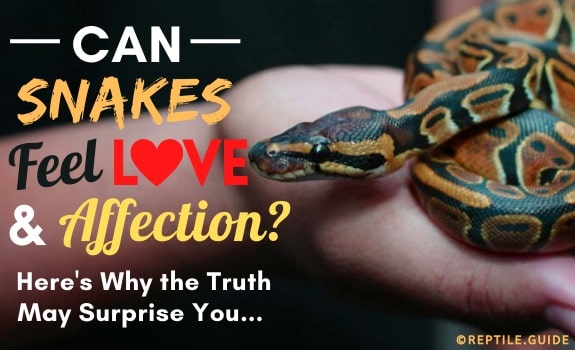You devote a big part of your life to making sure that your pet snake is well cared for – you carefully monitor the temperature and humidity of their enclosure, make sure that it has clean water, remove droppings, and feed it religiously.
You certainly care deeply for your scaly pal, and you may be wondering if he or she can reciprocate those feelings.
This is a common question, especially for snake keepers that enjoy the return of love and affection they might receive from their other pets like dogs, cats, or even rodents or birds.
Snakes’ mental capacity and emotions are not quite the same as ours or other mammals (more on this soon) but owning a snake can still be a rewarding hobby.
In This Article
Can Snakes Show Affection? How?
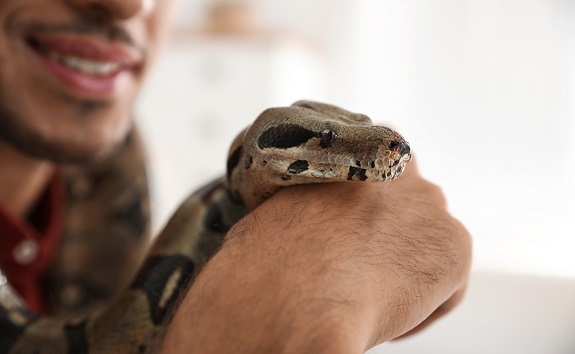
The brain of a snake and most other reptiles is very primitive and devoted to the core aspects of living a life in the wild – survival and reproduction.
They are capable of feeling emotions associated with survival and reproduction, like fear to avoid predators, pleasure when they are eating, comfortable, or breeding, and aggression to protect themselves.
They are also capable of learning that when you handle them, they are safe, and they may even enjoy the warmth that your body provides!
Still, there’s no way anyone can honestly know what is going inside the mind of a snake – or any animal’s brain. It might feel better to attribute some of your snake’s behaviors and feelings to love and affection.
⭐️Fun Fact: Attributing human characteristics and behavior to an animal is called anthropomorphizing. This is not a harmful thing to do, if you still recognize what is stressful and unhealthy for your snake, and it may help deepen the bond you feel for your animal – leading to better husbandry and earlier recognition of problems.
Let’s discuss some common behaviors you might see snakes exhibit when interacting with you, the scientific explanation for the action, and how you might interpret them from an anthropomorphic point of view.
Tongue Flicking
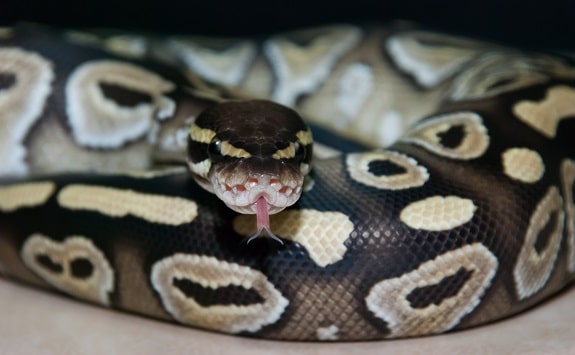
Scientific Explanation:
To make up for their poor vision and hearing, many snakes have an impeccable sense of smell. They even have a sophisticated piece of anatomy used to process scent, called a Jacobson’s organ.
Snakes use their sense of smell to determine whether creatures around them are predators or prey.
They can also become habituated to the scent of certain species, like human beings, and conclude that we are not a threat or that, when they smell us, they might be receiving food soon.
Anthropomorphic Explanation:
A snake’s tongue-flicking can remind us of sweet kisses from our puppy, or affectionate grooming from our kitty.
It can be easy to assume that our snakes are also giving us a “kiss,” or maybe they just really enjoy and are intrigued by the smells on our skin.
If you make sure that you don’t have the scent of potential prey on you, like rodents or birds, you can interpret your pet snake’s happy tongue-flicking however you see fit.
No matter how you may view it, they are actively learning more about you and becoming more comfortable with your presence with this behavior.
Wrapping
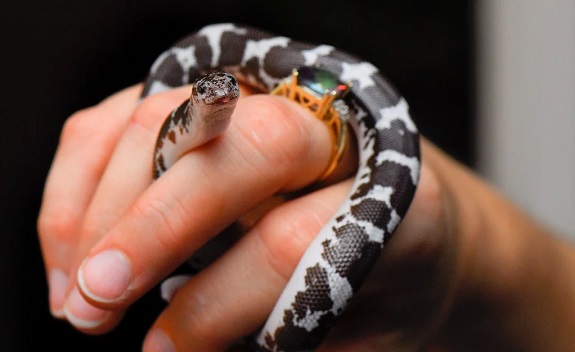
Scientific Explanation:
Since snakes don’t have any arms or legs, they must use their long, muscular bodies to balance and secure themselves when they’re up somewhere high – like in your arms.
Many snake species will instinctively wrap themselves around you in case they fall, just like they would wrap themselves around a tree limb in the wild. It helps them to feel more secure.
They may also be trying to absorb and enjoy as much of your body heat as they can and wrapping around you increases their surface contact area.
Anthropomorphic Explanation:
This behavior is commonly seen as and referred to as a “snake hug” among reptile fanatics.
It’s true, their tight embrace can feel warm and comforting, and it can make you feel closer to your pet on a physical and emotional level.
As long as your snake is not big enough to hurt you, and it’s not wrapping a dangerous part of your body, like your neck or your chest, it is safe for both you and your snake to allow and enjoy this behavior.
Approaching You
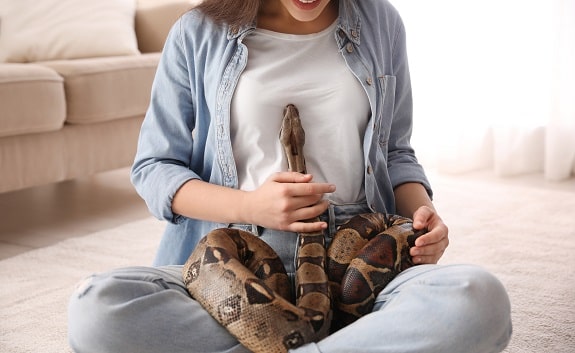
Scientific Explanation:
There are many different reasons that your pet snake may approach you. The most common goal is to check and see – or rather, smell – if you brought food.
A snake will frequently approach its owner; then, upon realizing that there is no food, the snake will carry on with whatever it was doing or go back to hiding.
A snake that approaches its owner may also be merely looking for new territory to hunt.
Snakes are also naturally drawn to heat, and the human body produces a ton of that.
Anthropomorphic Explanation:
Then again, maybe your snake simply likes interacting with you.
Perhaps it appreciates the additional exercise and mental stimulation that it gains from crawling around your hands, arms, body, and house.
As we said before, scientists have their theories about snake behavior, and snake owners have theirs, but no one can know for sure what, exactly, a snake is thinking when it does what it does.
Do Snakes Have Emotions and Feelings?
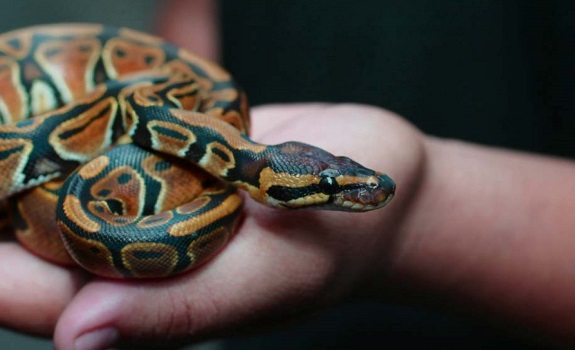
Fear
The scientific community and the hobbyist community both agree that snakes experience fear.
Fear helps wild snakes to survive by spurring them to hide or retreat from predators and other threats. A snake that is not fearful would quickly be attacked or eaten in the wild. It would not have the instincts required to flee and seek out safe cover.
Pet snakes may experience fear when they are…
- exposed to unfamiliar environments
- mishandled.
Some captive snakes are even afraid of live rodents, if they have never learned how to hunt and dispatch them correctly, or they had a bad bite experience.
Sadness and/or Depression
Snakes probably don’t feel sadness or depression in the same way that people feel it.
They aren’t social animals, so they likely don’t ever feel lonely. Their purposes in life are very basic and easy to fulfill in captivity.
The closest thing a snake may feel to sadness is boredom or lack of purpose. Even then, a snake can’t and won’t cry.
Boredom
Boredom in snakes likely occurs. If they aren’t using their brain, it may begin to slow down or shut down, and they can become inactive, uninterested in eating, and even grumpy.
They aren’t thinking sad thoughts, or about how they wish they could go out and party. It is more likely that they simply lose their drive to continue engaging in activities to sustain life.
Keeping your snake mentally engaged by offering various hides and enrichment objects in its enclosure will keep it content and healthy and prevent it from becoming “bored” or “sad.”
Pain
Snakes feel pain. They possess the portion of the brain that is necessary for processing pain in all vertebrates.
If pain is inflicted on them, they…
- will often hiss
- try to bite or escape
- coil up
Pain aids in encouraging behaviors that help snakes survive in the wild.
If a hawk picks a snake up with its long talons, the snake feels pain and bites the bird. The bird may let go, and then the snake can retreat and live another day.
In captivity, snakes may feel pain from…
- improper temperatures
- improper humidity causing retained skin and bad sheds
- habitat decorations falling on them or pinching them
- being accidentally crushed or squished by the enclosure door
- being dropped or squeezed too tightly during handling
Medical procedures can also cause varying amounts of pain, so your snake’s veterinarian should administer pain medications as appropriate.
Do Snakes Recognize Their Owners?
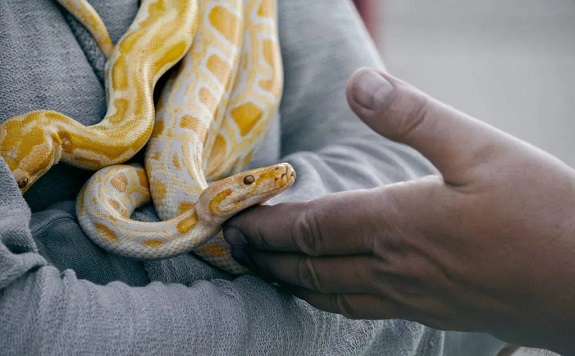
Like many other things we have discussed, this is a topic of some debate. Many snake keepers who have owned dozens or even hundreds of animals claim that some of their snakes react differently to their presence compared to the presence of a strange human.
On the other hand, scientists believe that snakes do not possess the brain anatomy required to remember one person from another.
Do Snakes Know their Name?
Different studies have been done on various snake species, which all adapted to survive in different environments, so it is difficult to come to any concrete conclusions about a snake’s ability to hear.
⭐️Fun Fact: Even though snakes don’t have a visible ear, they do all possess remnants of the piece of anatomy that allowed their ancestors to hear. It’s located in their skull, and it lets them “hear” vibrations.
Based on those studies, they may be able to hear anywhere from 80 to 300 Hz. Typical human speech is around 250 Hz, so the idea of your pet snake hearing you speak to it is not far-fetched.
However, even if your snake can hear you calling its name, or telling it about its delicious mouse, it is still unlikely to really process or remember any of the words that you use.
Like the way that it may become habituated to the smell of your skin, it can become habituated to the sound of your voice.
This may draw your snake out of hiding when called if you frequently use its name, but that doesn’t necessarily mean that it recognizes its name.
Wrapping Up Snakes and Love
Whether you want to take the scientific approach or the anthropomorphic approach to interpreting your pet’s behaviors, having a pet snake can still be rewarding.
It is exciting, comforting, and even heart-warming to see a scared, defensive little hatchling grow into a confident and content adult that recognizes your voice, scent, and appearance.
The more you handle your snake, the more they will be able to identify you.
Be sure to observe your snake for signs of stress from over-handling, but you should be able to gradually build up the amount of handling and “bonding” your pet can tolerate.
Even if your individual snake or species never enjoys being handled, it can be equally as rewarding to see them thrive in captivity, grow, reproduce, eat with confidence, and inquisitively explore new enrichment that you expose them to or place in their habitat.
Simply observing your snake’s natural behaviors can still be an excellent way to develop a bond and appreciation for them and what they are.
The care and keeping of any living animal should always be about recognizing them for what they are and for what capabilities and qualities they have – dogs are dogs and they bond closely with their owners, snakes are snakes and they appreciate the ability we give them to survive without risks of starving or being eaten.
